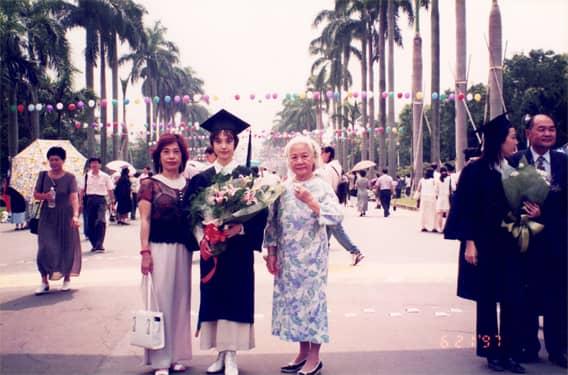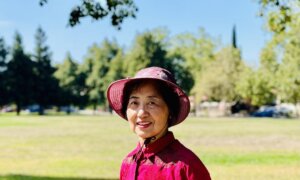“I could not get any help despite being in the hospital. It was truly terrifying. My body felt like an instrument of torture, a prison trapping and tormenting me,” recalled Isabella Murphy, who once suffered from fibromyalgia.
Originally from Taiwan, Ms. Murphy grew up in a happy family. She attended Taipei First Girls’ High School and later National Taiwan University. After graduating, she pursued two master’s degrees in biotechnology and computer engineering at the University of Connecticut. Ms. Murphy found a job before completing her master’s degrees and started a family in the United States. However, in 2005, a car accident turned her life upside down.

Ms. Murphy with her family at her graduation from National Taiwan University. (Courtesy of Isabella Murphy)
Just a month after starting her job, she was rear-ended on her way home. Though she did not sustain any external injuries, she suffered from soft tissue injuries and a mild concussion. The doctors told her that no treatment was needed and that she would recover slowly.
However, nine months later, her condition deteriorated, even affecting her ability to walk.
Dislocated Joints Throughout Her Body
Eventually, she decided to return to Taiwan to seek traditional Chinese medicine (TCM) treatment, as Western medicine could not cure her illness. She found an experienced orthopedic TCM doctor who carefully examined and adjusted each of her joints. After the treatment, she felt no more joint pain.
The doctor told her, “Each of your joints is dislocated, which is causing the pain.” When she asked why the X-rays appeared normal, he explained, “The dislocations fall within the margin of error for X-rays, so they do not show up, but they are indeed out of place.”
Unfortunately, due to the delay in treatment, the soft tissues and ligaments around her joints could no longer hold them in the correct position. Whenever she moved, her joints would dislocate again, requiring the doctor to readjust them.
Ms. Murphy’s father rented an apartment near the doctor’s residence and asked the doctor to assist her with rehabilitation exercises. “During these exercises, my joints would often dislocate, requiring me to return to the doctor for readjustment. This painful cycle persisted,” Ms. Murphy explained.
Diagnosed With an Incurable Disease
During the rehabilitation process, more severe neurological symptoms emerged. A year and a half after the car accident, Ms. Murphy began experiencing intense nighttime pain, often waking up in agony around 3 or 4 a.m. Her joints and muscles ached as if she had just completed a marathon. To alleviate the pain and soreness, she had to get up and walk around, loosening her stiff muscles before being able to return to sleep.
A fellow patient, also under the care of the same TCM orthopedic doctor, told her that she had a similar issue. After 15 years of consulting different doctors, she finally received a diagnosis of fibromyalgia.
Fibromyalgia is a condition characterized by abnormal pain perception, affecting an estimated 2 percent to 8 percent of the general population. Patients experience widespread pain and stiffness, often accompanied by severe fatigue, as well as memory, sleep, and mood disturbances.
Upon the recommendation of the fellow patient, Ms. Murphy enrolled in a clinical trial at Taipei Veterans General Hospital, one of Taiwan’s top teaching hospitals. However, after two months of treatment, her condition continued to deteriorate.
She recalled, “After the onset of fibromyalgia, the joint pain seemed to become less of an issue. In fact, fibromyalgia became the true source of my despair. The pain was a hundred, a thousand, even 10,000 times worse than the previous joint pain. I felt pain everywhere as it was a central nervous system disorder affecting all the pain-sensing nerves throughout my body. Even my breathing, body temperature, and blood sugar regulation were disrupted. I would often faint and had to carry a portable oxygen tank with me.”
Relying on Morphine for Pain Relief
On the morning of the Dragon Boat Festival, during her hospitalization, Ms. Murphy woke up in pain and tried to ask the nurse for morphine but found herself unable to speak.
“It was only then that I realized speaking requires the coordination of so many cells. All my willpower and strength were consumed by the effort to endure the pain, rendering me unable to utter even a single word. The realization dawned upon me that I could not get any help despite being in the hospital. It was truly terrifying. My body felt like an instrument of torture, a prison trapping and tormenting me,” she said.
The pain of fibromyalgia could only be relieved by morphine. In the adjacent ward, a 35-year-old patient was constantly hooked up to an IV drip, prepared for a morphine infusion at any moment. Despite experiencing severe pain, Ms. Murphy hesitated to request a higher dosage out of fear of morphine addiction.
As there was no cure, doctors could only prescribe medications that act on the central nervous system, such as anticonvulsants, sleeping pills, and mood stabilizers. However, she observed that her fellow patients underwent drastic personality changes after taking these medications, but their conditions showed little to no improvement.
Later on, she sought acupuncture treatment alongside other patients. While it helped alleviate the pain, allowing her to reduce her morphine intake by half, it was still not enough to restore her to normal life.
After a year and a half of treatment in Taiwan with no improvement, Ms. Murphy decided to return to the United States to reunite with her husband and endure the pain for the rest of her life.
Acupuncture treatment is rather expensive in the United States, so she hoped to find a way to self-administer it. While researching, she came across a column written by a TCM practitioner on The Epoch Times’ website.
The day before she left, she managed to see this doctor, who inserted needles at acupoints corresponding to the kidneys, liver, stomach, bones, and bone marrow. The doctor found that the blood that came out was all black, indicating that these organs were not in good condition. The doctor then asked Ms. Murphy, “Do you have any emotional knots?” At the end of the session, the doctor said, “You are going back to the United States, and no one can save you. You have to save yourself.” She gave Ms. Murphy two Falun Gong flyers and suggested that she learn about Falun Gong online.
Falun Gong consists of five sets of gentle exercises, including sitting meditation. It guides practitioners to elevate their moral characters by following the principles of truthfulness, compassion, and forbearance, thereby achieving physical and mental well-being. Ms. Murphy said she believed in the TCM practitioner’s high moral character. However, her immediate priority was quick pain relief so she could resume work immediately rather than investing time in learning qigong.

Ms. Murphy's wedding photo. (Courtesy of Isabella Murphy)
Enduring Severe Pain to Stay Alive
After returning to the United States, Ms. Murphy had no parental care, and her husband had to work during the day. While doing housework, she dislocated her joints again, leading to a two-week period of being bedridden. She could not even walk downstairs to eat; she was in too much pain and could not dress herself. She had to wait for her husband to return from work before having a meal.
She called her mother, expressing her desire to return to Taiwan. Even though her condition could not be cured, acupuncture could at least alleviate her pain, enabling her to walk and eat. However, her mother advised against her return, saying, “I have no money left. All the money has been spent on your medical treatment. If you come back for treatment, we will have to borrow money.”
Ms. Murphy cried intensely for three days. She even contemplated suicide, recalling rumors from medical school about how doctors ended their own lives. However, when she thought about how devastated her parents would be, she made up her mind, saying, “No matter how much pain I am in, I must keep living.”
Fibromyalgia is often accompanied by mental health issues. A systematic review indicated that patients with fibromyalgia were more than three times as likely to die by suicide compared to the general population.
Embracing Truthfulness, Compassion, and Forbearance
In despair, she remembered the Falun Gong practice the TCM practitioner recommended. She downloaded Falun Gong videos from the internet and followed along. However, when she attempted the squatting movement, her hip joint dislocated again, leaving her bedridden once more.
“I can’t even practice qigong!” She cried all night, overwhelmed with hopelessness. The next morning, she decided she should not give up so easily. Enduring the pain, she went downstairs to the computer and continued browsing the internet for information about Falun Gong, where she found its core book, “Zhuan Falun.”
After reading “Zhuan Falun,” she was deeply shaken and found answers to many of her questions. She resonated with the book’s teachings about being a good person by following the principles of truthfulness, compassion, and forbearance in all actions. The book explained that “forbearance” is not just about suppressing anger outwardly while still feeling upset inside, but about truly eliminating anger altogether. She reflected on her frequent arguments with her husband, which left her feeling sad afterward, yet she was unable to control her temper. She thought that if she could practice these principles, she would truly be a virtuous person. In fact, if everyone could achieve this, the world would be a much better place.
After finishing the book, she thought to herself, “Even if my illness does not improve, I will live according to the principles taught in ‘Zhuan Falun.’”
Overnight Relief From Pain
Since developing fibromyalgia, she had to move each muscle one by one every morning, taking about 30 minutes before she could sit up.
The morning after finishing “Zhuan Falun,” she prepared to move her limbs, bracing herself for the usual pain. However, something miraculous occurred. “Normally, I could only move my limbs a little bit, but at that moment, my hand lifted up easily. I thought I was dreaming. I tried moving another part of my body, and my other hand moved, too, without any pain!” She sat up, put her feet on the ground, and walked downstairs smoothly. Everything was just like before the car accident.
Ms. Murphy then began to learn Falun Gong’s seated meditation. Initially, she worried that her hip joint might dislocate, but after sitting for over half an hour, not only did it stay in place, but she also felt physically comfortable, filling her with joy.
A Miracle Beyond Scientific Explanation
Ms. Murphy, who previously conducted biomedical research at the University of Connecticut’s Department of Molecular Biology and Biophysics, stated that modern medicine has no explanation for how fibromyalgia can disappear overnight. She remarked, “There is so much more that we do not know compared to what we do know.”
A 2011 review published in Nature Reviews Rheumatology highlighted that, despite significant research on fibromyalgia in recent years, its pathophysiology is still not fully understood, with mechanisms of onset varying among patients. Clinical treatments are still in a trial-and-error phase, and the efficacy of pain medication is very limited. Additionally, nonpharmacological approaches, such as exercise and cognitive behavioral therapy, may offer better outcomes than medication, yet they are not widely used.
More than a decade has passed since August 2007, and Ms. Murphy is now healthier and stronger than before she fell ill. She describes her recovery as a “miracle.”
“I have always believed in God’s existence, but it was a distant hope. I never thought I would encounter God, but He actually acted upon me. I just did not see it with my own eyes.”

A recent photo of Ms. Murphy. (Courtesy of Isabella Murphy)
Falun Gong Significantly Improves Health
Falun Gong is one of the most popular mind-body cultivation practices today. Introduced by Master Li Hongzhi in 1992, by 1999, the number of practitioners in China had reached between
70 million and 100 million.
In the 1990s, the General Administration of Sport of China conducted a random survey of Falun Gong practitioners. Out of the tens of thousands surveyed, 77.5 percent reported complete or significant recovery from illnesses, with an additional 20.4 percent experiencing improvement. When combined, the overall effective rate reached 97.9 percent.
A 2020 study involving over 1,000 Taiwanese Falun Gong practitioners found that individuals with chronic conditions such as heart disease, diabetes, lung issues, and high blood pressure experienced a 70 percent to 89 percent improvement or recovery after practicing Falun Gong.



















